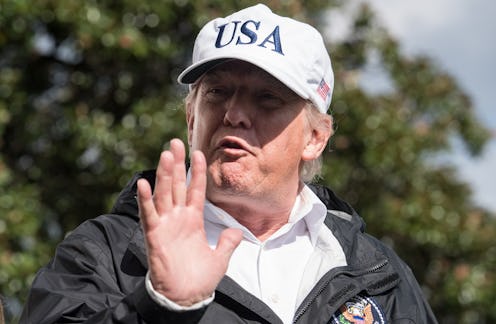News
Trump Promises To Veto “Medicare-For-All” As If He Was Going To Support It Anyway

On Wednesday, Bernie Sanders, along with several top Democrats, held a press conference to announce their support for the Vermont senator's "Medicare-For-All" plan, which would replace America's current hodge-podge health care system with a fully government-funded one, providing free medical care to all Americans. By Thursday afternoon, however, President Trump promised to veto Medicare-For-All.
The president announced on Twitter:
Bernie Sanders is pushing hard for a single payer healthcare plan - a curse on the U.S. & its people ... I told Republicans to approve healthcare fast or this would happen. But don't worry, I will veto because I love our country & its people.
It's a somewhat strange reassurance. For one thing, there already wasn't a real chance that Sanders' universal health care bill would make it to law in this Congress, unless a significant amount of the Republicans who had until recently been trying their hardest to cut government involvement in health care by hundreds of billions of dollars suddenly changed their mind and got on board with Sanders' goal of expanding government involvement in health care.
Sanders didn't even seem to really intend to have his bill voted on any time soon. His single-payer health care proposal deliberately left out any way to deal with how to pay for it, suggesting that it's more a declaration of principles than a piece of legislation intended to be passed through both houses of Congress. In fact, the main goal of Sanders' single-payer health care proposal maybe isn't passage at all. Instead, he could be trying to orient Democratic contenders for the 2020 presidential nomination around the policy goal of universal health care.
Trump's tweets seem to ignore all of this, and also have a strange view of single-payer health care. While there are plenty who raise serious criticisms of Sanders' plan, and government health care in general — higher taxes, potentially long wait times for care, lower reimbursements for doctors, and some people's inherent distaste for government control — referring to it as "a curse on the U.S. [and] people" seems more like the description of a disease than a method of treating it.
But the strangest thing about the way referred to the idea of single-payer health care is that, until he ran for president as a Republican — even, in numerous cases, while he was running for president as a Republican — Trump expressed strong support for the idea of government health care.
"We must have universal health care. Just imagine the improved quality of life for our society as a whole," Trump wrote in his 2000 book The America We Deserve, when he was considering running for president on the Reform Party ticket. He expressed praise for "the Canadian-style, single-payer system in which all payments for medical care are made to a single agency."
In 2015, a few months before he announced his run for president, Trump appeared on David Letterman, and extolled the values of the government-run health care system in Scotland.
"A friend of mine was in Scotland recently. He got very, very sick. They took him by ambulance and he was there for four days. He was really in trouble, and they released him and he said, ‘Where do I pay?’ And they said, ‘There’s no charge,’" Trump said. "Not only that, he said it was like great doctors, great care. I mean, we could have a great system in this country.”
The clip is below, with the relevant part starting around six minutes.
In the first Republican debate back in August 2015, Trump expressed a belief that other countries' single-payer systems worked well, though he also said that for America he prefers a private system. He did however say that he'd "take care of the people that can't take care of themselves," which sure sounds like a government health care system.
In September 2015, when Scott Pelley asked Trump on 60 Minutes about what he'd replace Obamacre with, he said, "Everybody's got to be covered. This is an un-Republican thing for me to say," and when asked how it would be paid for, he said "the government's going to pay for it."
Even after the election, some of Trump's previous views slipped out. On Jan. 15, just five days before he was sworn in and as Congressional Republicans geared up to start their process of repealing Obamacare, Trump told the Washington Post that he wanted "insurance for everybody," contradicting the plans his own party had for a health care bill.
That was then, before the president spent months trying to roll back government health care benefits along with Republicans in Congress. Whatever common ground Donald Trump may have had with Bernie Sanders on the issue of health care a few months ago is gone now, as his tweet makes clear.